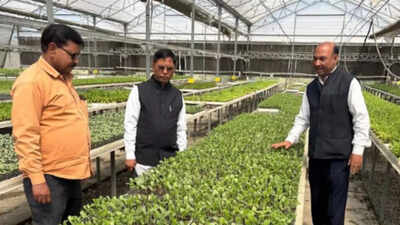ARTICLE AD BOX

LUCKNOW: Uttar Pradesh is heading to cement its place as a hub for cutting-edge agriculture practices and currently ranks second in India for Centres of Excellence (CoEs) powered by Indo-Israel-Dutch technology, said
Minister of State (Independent Charge) for Horticulture, Dinesh Pratap Singh.
Centers, located in Mirzapur, Bundelkhand, and Barabanki, are focusing on dragon fruit, citrus fruits, and flower-vegetable cultivation with the help of new techniques and international expertise to rural heartlands.In Jhansi’s Barua Sagar, the CoE for citrus is gearing up at the Horticulture and Training Center. "Israeli experts, under the Indo-Israel project, are bringing their world-renowned knowledge to guide farmers in growing limes, lemons, kinnows, and grapefruits. This marks another milestone for Uttar Pradesh, which already ranks second in India for CoE built with Indo-Israel technology," said minister Dinesh Pratap Singh.While in Barabanki’s Sonikpur village, nestled in the Trivediganj development block of Haidergarh tehsil, the first-ever Indo-Dutch CoE for vegetables and flowers is taking shape. Experts from the Netherlands have already visited, their boots crunching on the soil as they surveyed the site, sharing know-how on advanced cultivation methods.Similarly, in Mirzapur’s Deori-Kala village, the CoE for Dragon fruit is being set up at a government farm in Marihan tehsil.
The Indian Horticultural Research Institute in Bangalore and Agricultural University in Kota, Rajasthan, are lending their expertise to introduce farmers to the exotic, vibrant dragon fruit and even dates. The center will showcase everything from planting to harvesting, helping farmers diversify and tap into growing markets for these high-value crops.“These centers aren’t just fields and greenhouses—they’re hubs of learning.
Each one offers demonstrations and training on the latest crop varieties and techniques, from production to market. Farmers can walk through, see modern methods in action, and adopt them to boost productivity, diversify crops, and replace outdated practices with profitable ones,” added minister.The state’s existing CoEs—located in Basti (fruits and vegetables), Kannauj (vegetables), Saharanpur (fruits and vegetables), and Alambagh, Lucknow (ornamental plants)—have already set benchmarks.
The six upcoming centers will specialize in fruits (Kaushambi), vegetables (Chandauli), honey (Saharanpur and Rae Bareli), and aeroponics potatoes (Hapur and Kushinagar), further expanding the state’s agricultural portfolio.The Horticulture Department’s achievements extend beyond CoEs. In 2022, it produced 76 lakh quality saplings in government nurseries. Now, with 150 hi-tech nurseries, the state aims to churn out 28 crore saplings annually—a 30-fold capacity increase in three years.
An International Potato Research Center in Agra is also in the works, promising to elevate potato farming with global standards.Mango farmers, a backbone of Uttar Pradesh’s economy, are set to benefit from innovative practices. “We’re using paper bags to protect mangoes from chemicals and insects, ensuring premium quality for export,” Singh explained. A planned Integrated Testing Treatment Park near Jewar will test and treat produce to meet international standards, opening markets worldwide.



.png)
.png)
.png)
















 1 day ago
5
1 day ago
5









 English (US) ·
English (US) ·